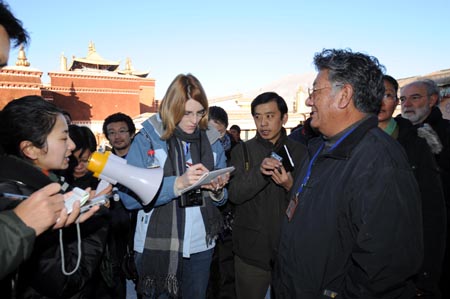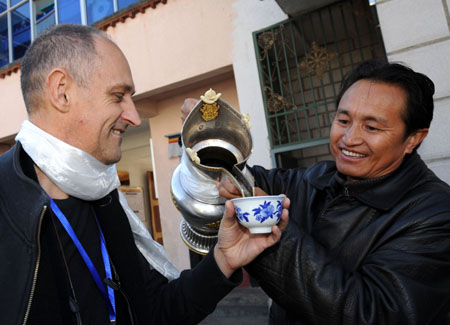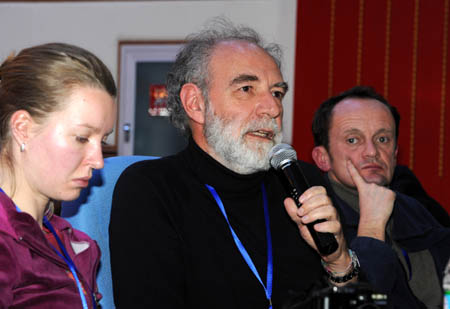The State Council Information Office and the Foreign Ministry organized a group of journalists from home and abroad to visit the Tibet Autonomous Region in southwest China to cover the social and economic development of Tibet since the Democratic Reform in 1959.
At a press conference, Vice-Chairman of the Standing Committee of the Tibet Autonomous Regional People's Congress Nyima Cering and other officials answered questions from the reporters concerning the social and economic progress Tibet had made, changes in Tibetan people's livelihood, the protection of ethnic groups and religion, traditional culture and ecological environment, as well as goals the government would try to achieve this year.
 |
|
Qamba Gesang, director of the Potala Palace Administration, receives an interview by Chinese and foreign reporters, in Lhasa, capital of southwest China's Tibet Autonomous Region, Feb. 11, 2009. (Xinhua/Chogo) |
To find out for themselves changes and progress in Tibet since the Democratic Reform was carried out 50 years ago is on top of the journalists' agenda. During their visits to various villages all over Tibet, a special tour was made to a village named Kesong, in Shannan Prefecture, which was the first in Tibet to launch the Democratic Reform in 1959.
In Kesong, sitting around a 73-year-old man by the name of Qijia, the reporters listened attentively to his stories of the dark old days under the feudal serfdom.
In a simple but vivid way, Qijia told great changes in his life since the Democratic Reform, which the reporters recorded eagerly with their pens and cameras. The journalists were excited to have an opportunity to see for themselves the remarkable changes in Tibetan people's living standard.
|

|
|
?A foreign reporter tastes the wine made of highland barley in Lhasa, capital of southwest China's Tibet Autonomous Region, Feb. 11, 2009. (Xinhua/Chogo) |
A reporter from South Korea's SBS said that Kesong village bore some resemblance with the place where he used to live, which called in him an affinity to the village. "Seeing and hearing for myself changes that occurred to people living in here, I can tell local people's livelihood has been improving," he added.
Another jounalist from Kyodo News in Japan expressed his surprise at finding local villagers living in houses much more spacious than his in Tokyo.
In addition, the group of reporters had interviews and informal discussions with religious personages, Tibetologists and experts in Tibetan medicine. A RAI reporter from Italy who came to Tibet for the fourth time, said: "Via introductions made by the Tibet Autonomous Regional Academy of Social Sciences, we have learned that the government has done a lot of research on the protection of Tibetan culture and has been working on it. That is a long and arduous task, but the government has done a really good job."
|

|
|
An Italian reporter asks questions during the press conference held by the Information Office of the Tibet Autonomous Region government in Lhasa, capital of southwest China's Tibet Autonomous Region, Feb. 10, 2009. (Xinhua/Chogo) |
The reporters also visited monasteries to interview monks and pilgrims, and they saw with their own eyes how well Tibetan culture and religion are protected and the religious freedom the public is enjoying.
(Tibet Daily February 16, 2009)